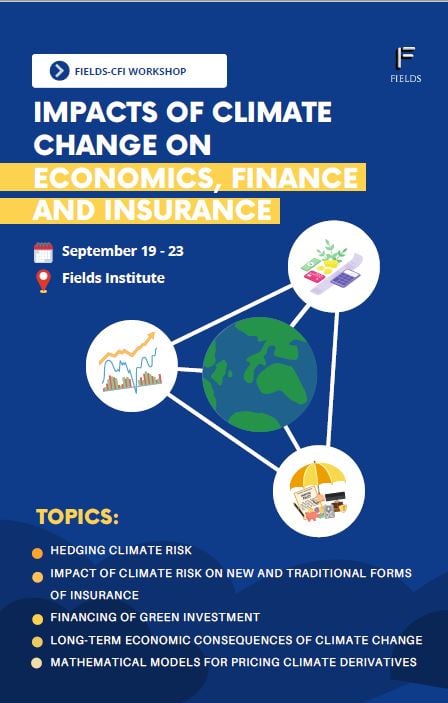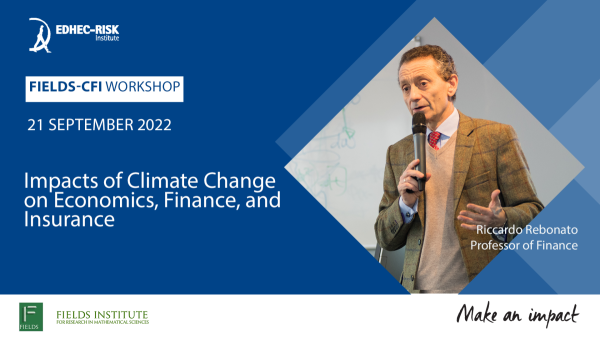Fields-CFI Workshop: Impacts of Climate Change on Economics, Finance, and Insurance

Beyond DICE: What the New-Generation Integrated Assessment Models Can Teach Us About the Optimal Abatement Policy
Presentation
Climate change is a pre-eminent risk facing humanity in the 21st century, with ongoing and potential impacts on all aspects of human life. This workshop will bring together leading experts from the academic community, policy makers, and the financial and insurance industries to discuss mathematical modelling of climate risk, as well as the consequences of climate change for financial markets, insurance, and the broader economy.
In addition to equipping the financial and insurance industries with new analytical tools for managing and hedging climate risk, the major objective of the Fields-CFI Workshop on Impacts of Climate Change on Economics, Finance, and Insurance consists in evaluating the effectiveness of different policy and regulatory frameworks, from carbon pricing to subsidies and green central banking.
Session Themes
- mathematical models for pricing climate derivatives
- hedging climate risk
- impact of climate risk on new and traditional forms of insurance
- financing of green investment
- long-term economic consequences of climate change
Agenda
On september 21, at 3:30pm CET, Riccardo Rebonato, Professor of Finance, EDHEC Business School, Programme Director (Implications of Climate Change on Asset Pricing and Investment Management), EDHEC Risk Climate Impact Institute, has been invited to give a keynote talk on optimal abatement with IAMs. He will discuss "Beyond DICE: What the New-Generation Integrated Assessment Models Can Teach Us About the Optimal Abatement Policy".

ACCESS FULL AGENDA & REGISTER FOR THE WORKSHOP
You can access his latest research published in the Journal of Portfolio Management Novel Risks 2022 entitled "Climate Output at Risk", co-authored with Dherminder Kainth, Senior Researcher at EDHEC Risk Climate Impact Institute and Lionel Melin, Chief Researcher at MacroLucid Research.
Authors extend a leading integrated assessment model (IAM) to incorporate the latest physics and economics findings to study the impact of three emission abatement schedules (BAU, SLOW, and FAST) on economic output over the next 150 years. The authors find that abating little means betting that tipping points do not exist, or that their threshold temperatures are many degrees above current temperatures. This study also shows that its payoffs are small. Furthermore, the insurance cost of substantially reducing the impact of tipping points is very low, even for the more aggressive abatement schedules: fast decarbonization delivers considerable benefits in most climate scenarios and, even in the most climate-benign scenarios, only marginally reduces output. Investors who channel their wealth toward abatement-enhancing investments buy cheap insurance for their portfolios.
About The Fields Institute for Research in Mathematical Sciences
The Fields Institute is a centre for mathematical research activity - a place where mathematicians from Canada and abroad, from academia, business, industry and financial institutions, can come together to carry out research and formulate problems of mutual interest. Their mission is to provide a supportive and stimulating environment for mathematics innovation and education. The Institute promotes mathematical activity in Canada and helps to expand the application of mathematics in modern society.
About the Centre for Financial Industries
Over the past two decades, the Fields Institute has acquired leadership in the area of quantitative finance. Notable activities include an ongoing world-renowned monthly seminar series, a highly successful six month thematic program, and a variety of workshops, conferences, short courses and industrial-academic events.
Created in 2015, the Centre for Financial Industries is the new focal point for these activities, providing visibility for the expertise of its members, facilitating corporate collaboration and enabling rapid mobilization of resources.


